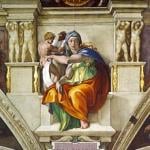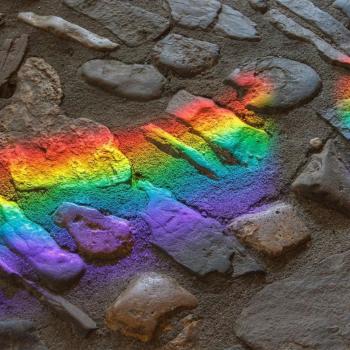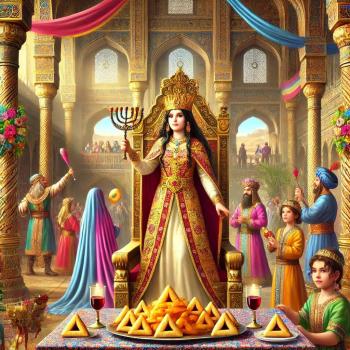Editors' Note: This article is part of the Patheos Public Square on the Future of Faith in America: Progressive Christianity. Read other perspectives here.
"The God who made the world and everything in it is the Lord of heaven and earth and does not live in temples built by human hands. And God is not served by human hands, as if God needed anything. Rather, he himself gives everyone life and breath and everything else…'For in God we live and move and have our being." ~ Apostle Paul, Acts 17:24, 25, 28
When our son was only a few months old he needed more food than he was getting through nursing, so he was hungry most all the time. We were unaware of what was going on. His cries only seemed to be soothed by riding in the car, so I would drive him around at night hoping he would stay asleep and I would stay awake. The pressure that comes from trying to help a baby fall asleep is intense. There is something about the incessant crying that made me feel like I was losing my mind. While driving around aimlessly in the middle of the night to help my son sleep, I felt like I was the one who needed to scream.
It sounds harsh, but in becoming a parent I had to come to grips with the sense of feeling trapped. This feeling doesn't go away quickly. As we raised our kids through childhood, life kept feeling small and predictable. I recall doing my best to be present while reading the same bedtime story for the seventeenth night in a row and not allow my mind to wander into dark territory. I had to fight off the fear that this was all life was going to be, a repeating rhythm of Goodnight Moon and Pat the Bunny and Oh, the Places You'll Go.
Shelley, who was home most of the day with our two small children, experienced it even more deeply. A simple trip to the grocery store without a baby in tow felt like a Get Out of Jail Free card.
I was reminded of this feeling as I cared for my parents at the end of their lives. Sitting up through the night in their last days helping them get comfortable, making sure they had water, and hoping they would fall asleep brought me right back to caring for our babies. At both ends of life, it seems, life is lived in the small, the simple, the ordinary. It's the small gestures that become the most important.
The in-between years can be filled with varying levels of what seems like a not-so-small life. On the grand scale of things, however, most of us live rather limited and simple lives. Even if we see ourselves as frequent travelers we don't really go that many places on our planet, and the places we do visit tend to have been well-traveled. No matter how much knowledge we acquire, we really know almost nothing compared to all that is knowable. There are 7 billion people alive who have no idea we even exist.
Simply put, we are simple people.
And yet, many of us also have a yearning for something more. We want to be part of something bigger than ourselves. We want our simple lives to have meaning beyond our first and last breaths. Religion and faith hold appeal for many of us because they give us a bigger story to belong to. That's why I think the Christian understanding that "In God we live, move, and have our being," as the Apostle Paul put it, is such good news. It hints at what it means to be part of a grand whole, a never-ending story. The call for the future of faith is to find our meaning in the grand whole not only the particular expressions of our own faith and culture.
I like the way my friend Michael Dowd talks about things. He has a way of opening ideas to their biggest frame so he can see the whole picture. He brings this way of seeing to history, science, and religion as well. Dowd calls himself a Big History Evangelist. He wants people to see the grand narrative of life, science, religion, and all things. He has said: "Big History is a way to think about the history of the universe and our place in it. Big History includes everything from the first few nanoseconds after the Big Bang to the birth and death of stars, the formation of our solar system and planet Earth, the emergence and evolution of life, and all of human history including the evolutionary significance of religion and science, right up to you now reading this."
I love thinking that the simple life we live is part of a grand story.
This is where I often find a rub with the way people discuss faith. So often conversations of faith and Christianity feel like a small, specific story. Faith can feel limited, a lot like late nights with an infant where we are circling a room in the dark, trying to avoid running into furniture, praying the baby will drift off to sleep. With the life of faith, one often feels that committing to one tradition requires closing our eyes to all the stories and ways of others.




